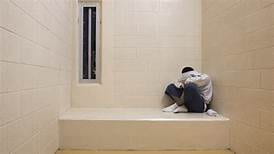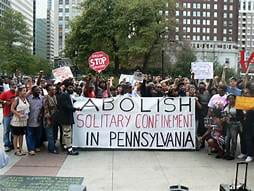
One of the saddest stories that I ever listened to was the story of Kalief Broder. He was a young man from the Bronx who spent three years in jail because he could not pay for his bail after being arrested in 2010. I heard about this story while watching 13th, the documentary that examines the connection of slavery to the mass incarceration of Black people in America. While I looked at Broder’s experience through the lens of racial injustice, there was another piece to this disheartening story. Broder also spent two years in solitary confinement without being convicted of a crime or having a trial. Broder was finally released from prison in 2013; two years later, he committed suicide by hanging himself in his parents home.

After making the connection between solitary confinement and mental illness, I started doing more research on this and thought about it in the context of human rights. The connection stems from the lack of connection between human rights and the rights of prisoners. In the context of solitary confinement and human rights, the overpractice of solitary confinement violates the human rights of prisoners. These violations include torture, mental abuse lack of resources such as sunlight and social interaction. To give a background on human rights in the scope of prisoners, their rights have been recognized by the United Nations to protect those rights. According to the Office of the High Commissioner in the United Nations Human Rights Office of the High Commissioner, the basic principles on the treatment and conditions inmates were adopted and proclaimed by the United Nations in December of 1990. One of the most profound statements stated that “All prisoners shall be treated with the respect due to their inherent dignity and value as human beings”. Although their rights have been recognized by the human rights community, most of the rights of prisoners are often abused due to this underlying notion that perhaps prisoners are not even seen as humans and do not need their rights to be protected. If their rights and humanity were protected by the state, then their rights would not be abused.
To give a context to the global prison system, the United States plays a big role within it. According to the Prison Policy Initiative, the United States has the highest incarceration rate worldwide. The use of solitary confinement is also used widely within the United States. The definition of solitary confinement is the isolation of a prisoner in a confined cell as a form of punishment. According to the Human Rights Watch, prisoners are “Prisoners in solitary typically spend 22 to 24 hours a day locked in small, sometimes windowless, cells sealed with solid steel doors”. While confined they do not have any contact with other inmates besides a prison guard that serves them their meals through a small opening on the door. The National Public Radio did a special series on the practice of solitary confinement. In the series, the hosts explain that the first documented use of solitary confinement in 1829. It was used in the Eastern State Penitentiary in Philadelphia. Based in Quaker belief, it was seen as a place where criminals were locked in a stone cell with a Bible to pray and repent for the crimes. Although it was seen as a place for rehabilitation, many criminals went insane and committed suicide while being locked in the cells. After this, solitary confinement slowly stopped being practiced for many decades.

This practice was proven to be detrimental to the mental health of human beings over the course of decades. As the statement proves to be true, it is still used widely in the United States. The Human Rights Watch has offered research to the growing use of solitary confinement in prisons. The research states that solitary confinement in US prisons is imposed for different reasons, but most commonly it is used as punishment for breaches of discipline such as disciplinary segregation to manage prisoners considered to be particularly difficult or dangerous through administrative segregation. The increase in solitary confinement in the United States has occurred primarily through administrative segregation, and particularly the segregation of prisoners in special super-maximum security facilities, which are built solely for this purpose. Solitary confinement is not only used to punish prisoners physically but also mentally.
According to the American Civil Liberties Union or ACLU, the U.N. Special Rapporteur on torture, Juan Mendez, has condemned the use of solitary confinement, finding that the imposition of this punishment can constitute torture, cruel, inhuman or degrading treatment or punishment. The effects of solitary confinement are so damaging that it has been deemed as torture for human beings. According to the Human Rights Campaign, prisoners that are held in solitary confinement, they do not have opportunities for meaningful social interaction with other prisoners. The contact that they do have with officers is very brief and interaction only occurs when prisoners are being handed food through a small door. Phone calls and any visits by family and loved ones are severely restricted or prohibited. During the week, prisoners are let out for showers and solitary exercise in a small, enclosed space, sometimes indoors on a few times a week. They often have very little or no access to educational and recreational activities or other sources of mental stimulation. Lastly, they are usually handcuffed, shackled, and escorted by correctional officers every time they leave their cells. This also goes into them not having any access to sunlight or adequate housing that it is fit for the shelter of any human being. The research from the American Civil Liberties Union shows that the practice of solitary confinement can also damage an inmate on the psychological level. There are quite a few destructive effects of solitary confinement that include perceptual distortions and hallucinations increased anxiety and nervousness, along with self mutilation, severe chronic depression, and lower levels of brain activity.
Another issue with this is the use of solitary confinement for inmates who are mentally ill. Statistics from ACLU state that most experts would estimate that approximately 10 to 20 percent of all prisoners in United States prisons suffer from a mental illness. One story noted from ACLU from a prisoner who was mentally ill who spent time in solitary confinement actually set himself on fire and succumbed from his burns while another prisoner hung himself with a washcloth. It was also noted that prisoners were found to have attempted or have committed suicide, ingested razors, or have pummeled their heads against walls. The issue with solitary confinement is the damaging psychological effects that it can have on the individual. By limiting social interaction, the prison is depriving one of social interaction that is crucial for psychological growth and when that is interrupted that could have a detrimental influence on the individual. For those that are released from prison, they still face psychological harm from their time spent in solitary confinement. Craig Haney, PhD is a member of the American Psychology Association and a professor of psychology at the University of California who evaluates the psychological effects of solitary confinement on a human being. He states that “one of the very serious psychological consequences of solitary confinement is that it renders many people incapable of living anywhere else.” Then, when prisoners are released into cells or back into society, they are often overwhelmed with anxiety.” They actually get to the point where they become frightened of other human beings,” he said. These long term effects from solitary confinement leave a damaging mark on the humanity of these people and mentally abuses their human rights to the worst degree.

With all of these human rights abuses, there should be an effort to abolish solitary confinement in prisons all over the world. It has too many detrimental effects on human beings and abuses the rights of prisoners and as members of society. There have been efforts by the American Civil Liberties Union to abolish solitary confinement. Their statement reads: “Over the last two decades corrections systems have increasingly relied on solitary confinement as a prison management tool – even building entire institutions called “supermax prisons” where prisoners are held in conditions of extreme isolation, sometimes for years or decades. But solitary confinement jeopardizes our public safety, is fundamentally inhumane and wastes taxpayer dollars. We must insist on humane and more cost-effective methods of punishment and prison management”. In order for this issue to be solved, there must be major reform within the prison system and more access to mental health resources and rehabilitation services for prisoners. It does not do any good to lock people into cages to the point where they do not even know that they are human anymore. Even though they have committed crimes, these people are still human beings and their rights deserve to be protected.


